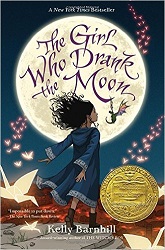by Kelly Barnhill
Algonquin Young Readers, 2016. 388 pages.
Starred Review
2017 Newbery Medal Winner
In the Protectorate every year, the youngest baby is left in the woods for the Witch.
But this year, the mother of the child protests and goes mad and has to be locked up.
And Antain, the young apprentice to the Elders is disturbed by what he sees and asks uncomfortable questions. But the elders leave the baby anyway.
They left her knowing that there surely wasn’t a witch. There never had been a witch. There were only a dangerous forest and a single road and a thin grip on a life that the Elders had enjoyed for generations. The Witch – that is, the belief in her – made for a frightened people, a subdued people, a compliant people, who lived their lives in a saddened haze, the coulds of their grief numbing their senses and dampening their minds. It was terribly convenient for the Elders’ unencumbered rule. Unpleasant, too, of course, but that couldn’t be helped.
They heard the child whimper as they tramped through the trees, but the whimpering soon gave way to the swamp sighs and birdsong and the woody creaking of trees throughout the forest. And each Elder felt as sure as sure could be that the child wouldn’t live to see the morning, and that they would never hear her, never see her, never think of her again.
They thought she was gone forever.
They were wrong, of course.
Now, there is a witch who lived in the woods named Xan. Here’s her perspective on the Day of Sacrifice:
For as long as Xan could remember, every year at about the same time, a mother from the Protectorate left her baby in the forest, presumably to die. Xan had no idea why. Nor did she judge. But she wasn’t going to let the poor little thing perish, either. And so, every year, she traveled to that circle of sycamores and gathered the abandoned infant in her arms, carrying the child to the other side of the forest, to one of the Free Cities on the other side of the Road. These were happy places. And they loved children.
But this year, which was turning out so differently from usual, something about the baby caught at Xan’s heart. And as she journeyed with the baby, she accidentally fed it moonlight rather than the usual starlight.
There is magic in starlight, of course. This is well known. But because the light travels such a long distance, the magic in it is fragile and diffused, stretched into the most delicate of threads. There is enough magic in starlight to content a baby and fill its belly, and in large enough quantities, starlight can awaken the best in that baby’s heart and soul and mind. It is enough to bless, but not to enmagic.
Moonlight, however. That is a different story.
Moonlight is magic. Ask anyone you like.
So, baby Luna gets enmagicked, and Xan realizes that means she must care for the baby herself. So Luna grows up in the forest with tiny dragon Fyrian (who thinks he is Simply Enormous) and bog monster Glerk. When her magic comes in, there may be disastrous consequences, so Xan has to take momentous steps to control it.
Luna has no idea of her origins. And Xan has no idea what she has set in motion – things that are going to change the lives of everyone in the Protectorate and the forest. They will find the source of all the Sorrows and discover how to fight against it.
This is a lovely book with a fantasy world not quite like any other. We have the usual quest of good versus evil, but it proceeds in surprising ways.
I like the way this book celebrates Love and Joy. And conquering those who feed on Sorrows.
kellybarnhill.wordpress.com
AlgonquinYoungReaders.com
Find this review on Sonderbooks at: www.sonderbooks.com/Childrens_Fiction/girl_who_drank_the_moon.html
Disclosure: I am an Amazon Affiliate, and will earn a small percentage if you order a book on Amazon after clicking through from my site.
Source: This review is based on a library book from Fairfax County Public Library.
Disclaimer: I am a professional librarian, but I maintain my website and blogs on my own time. The views expressed are solely my own, and in no way represent the official views of my employer or of any committee or group of which I am part.
What did you think of this book?
